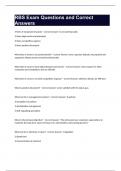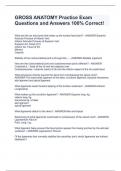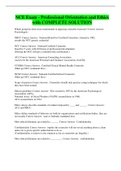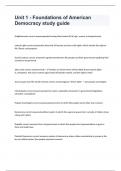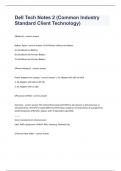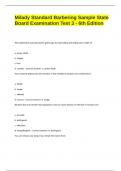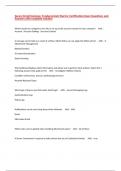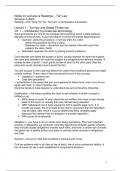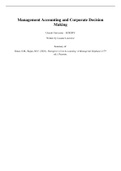The Interplay Between Goal Intentions and
Implementation Intentions
Paschal Sheeran, Thomas L. Webb, Peter M. Gollwitzer (2005)
Goal intentions: specify what one wants to achieve “I intend to achieve X!”
Implementation intentions: specify the behaviour one will perform in the service of the goal
and the situational context in which one will enact it “If situation Y arises, then I will initiate
goal-directed behaviour Z!”
Implementation intentions are formed through a conscious act of will BUT evidence shows that
action initiation proceeds in an automated manner.
● Therefore, scholars state that forming an implementation intention increases the
likelihood of attaining one’s objectives compared to the formation of a goal intention on
its own.
Little research was conducted on whether forming an implementation intention means that
behaviour is obtained because of situational cues in a mechanical fashion.
● When the person encounters the opportunity to act that was specified in his or her
implementation intention, behaviour is initiated automatically and in a manner that is
not consistent with the underlying goal intention (e.g., one finds oneself selecting the
low-fat meal at lunchtime as specified in one’s plan despite a weak goal intention to
diet).
The aim of the present research is to test whether the rate of goal achievement caused by
implementation intentions is sensitive to the presence and absence of a superordinate (higher
in status) goal intention.
Concepts
Implementation Intentions: Effects and Processes
Implementation intentions have been shown to be effective in promoting:
● Infrequently performed behaviours such as cancer screening and behaviours that are
performed daily (e.g., supplement use)
● Self-report and objective measures of performance
● Behavioural performance among students, the general public, and clinical samples
Processes through which implementation intentions benefit goal achievement:
● The critical situation (specified in the if-component of the plan) becomes highly
accessible when people form an implementation intention.
○ Consequence: these cues are detected swiftly and with precision
● The initiation of the intended behaviour (specified in the then-component of the plan)
becomes automated when people form an implementation intention.
1
, ○ Action control by implementation intentions exhibits key features of automaticity
including immediacy, efficiency, and lack of awareness.
○ Examples of studies showing that:
■ Gollwitzer and Brandstätter (1997, Experiment 3) showed that
participants who formed implementation intentions to make
counterarguments to racist remarks at specified opportunities did so
more immediately (quickly) than did participants who only formed goal
intentions.
■ Brandstätter, Lengfelder, and Gollwitzer (2001) investigated the
efficiency of implementation intentions by manipulating the cognitive
load either through their choice of the sample (e.g., schizophrenic
patients, heroin addicts under withdrawal) or by using a dual-task
paradigm in experiments with college students and found that load had
no impact on the effectiveness of implementation intentions.
■ Bayer, Moskowitz, and Gollwitzer (2002) obtained evidence that
awareness of the situational cue is not required for the effective
operation of implementation intentions.
Forming an implementation intention promotes goal achievement because the person is
perceptually ready to encounter the situational cues specified in the if-component of his or her
plan. Moreover, these cues evoke the specified then-response in a manner that does not
require conscious awareness or effort on his or her part.
Action Control by Situational Cues versus Goal Intentions
Forming an implementation intention = passing control of an intended behaviour from the self
to specified situational cues:
● Decide in advance what to do and under which conditions to do it
● When the specified cues are encountered, behaviour happens automatically,
immediately, efficiently, and without the need for conscious awareness
● The if-then plan switches action control from a conscious effortful mode (action control
by goal intentions) to stimulus control of behaviour (action control by implementation
intentions).
Hypothesis 1:
This research is concerned with whether the situational control of behaviour produced by
implementation intentions is sensitive or indifferent to the state of the underlying goal intention.
The question investigated here is whether the automatic action initiated by implementation
intentions is moderated by the person’s goal. In other terms, whether implementation
intentions could give rise to behaviour irrespective of the state of the underlying goal intention.
One line of research says that behaviour is either controlled by habits or by goal
intentions
This idea finds support in research on action slips from Heckhausen and Beckmann (1990).
described a particular type of slip where planning how one would achieve a goal brought
2
Implementation Intentions
Paschal Sheeran, Thomas L. Webb, Peter M. Gollwitzer (2005)
Goal intentions: specify what one wants to achieve “I intend to achieve X!”
Implementation intentions: specify the behaviour one will perform in the service of the goal
and the situational context in which one will enact it “If situation Y arises, then I will initiate
goal-directed behaviour Z!”
Implementation intentions are formed through a conscious act of will BUT evidence shows that
action initiation proceeds in an automated manner.
● Therefore, scholars state that forming an implementation intention increases the
likelihood of attaining one’s objectives compared to the formation of a goal intention on
its own.
Little research was conducted on whether forming an implementation intention means that
behaviour is obtained because of situational cues in a mechanical fashion.
● When the person encounters the opportunity to act that was specified in his or her
implementation intention, behaviour is initiated automatically and in a manner that is
not consistent with the underlying goal intention (e.g., one finds oneself selecting the
low-fat meal at lunchtime as specified in one’s plan despite a weak goal intention to
diet).
The aim of the present research is to test whether the rate of goal achievement caused by
implementation intentions is sensitive to the presence and absence of a superordinate (higher
in status) goal intention.
Concepts
Implementation Intentions: Effects and Processes
Implementation intentions have been shown to be effective in promoting:
● Infrequently performed behaviours such as cancer screening and behaviours that are
performed daily (e.g., supplement use)
● Self-report and objective measures of performance
● Behavioural performance among students, the general public, and clinical samples
Processes through which implementation intentions benefit goal achievement:
● The critical situation (specified in the if-component of the plan) becomes highly
accessible when people form an implementation intention.
○ Consequence: these cues are detected swiftly and with precision
● The initiation of the intended behaviour (specified in the then-component of the plan)
becomes automated when people form an implementation intention.
1
, ○ Action control by implementation intentions exhibits key features of automaticity
including immediacy, efficiency, and lack of awareness.
○ Examples of studies showing that:
■ Gollwitzer and Brandstätter (1997, Experiment 3) showed that
participants who formed implementation intentions to make
counterarguments to racist remarks at specified opportunities did so
more immediately (quickly) than did participants who only formed goal
intentions.
■ Brandstätter, Lengfelder, and Gollwitzer (2001) investigated the
efficiency of implementation intentions by manipulating the cognitive
load either through their choice of the sample (e.g., schizophrenic
patients, heroin addicts under withdrawal) or by using a dual-task
paradigm in experiments with college students and found that load had
no impact on the effectiveness of implementation intentions.
■ Bayer, Moskowitz, and Gollwitzer (2002) obtained evidence that
awareness of the situational cue is not required for the effective
operation of implementation intentions.
Forming an implementation intention promotes goal achievement because the person is
perceptually ready to encounter the situational cues specified in the if-component of his or her
plan. Moreover, these cues evoke the specified then-response in a manner that does not
require conscious awareness or effort on his or her part.
Action Control by Situational Cues versus Goal Intentions
Forming an implementation intention = passing control of an intended behaviour from the self
to specified situational cues:
● Decide in advance what to do and under which conditions to do it
● When the specified cues are encountered, behaviour happens automatically,
immediately, efficiently, and without the need for conscious awareness
● The if-then plan switches action control from a conscious effortful mode (action control
by goal intentions) to stimulus control of behaviour (action control by implementation
intentions).
Hypothesis 1:
This research is concerned with whether the situational control of behaviour produced by
implementation intentions is sensitive or indifferent to the state of the underlying goal intention.
The question investigated here is whether the automatic action initiated by implementation
intentions is moderated by the person’s goal. In other terms, whether implementation
intentions could give rise to behaviour irrespective of the state of the underlying goal intention.
One line of research says that behaviour is either controlled by habits or by goal
intentions
This idea finds support in research on action slips from Heckhausen and Beckmann (1990).
described a particular type of slip where planning how one would achieve a goal brought
2


